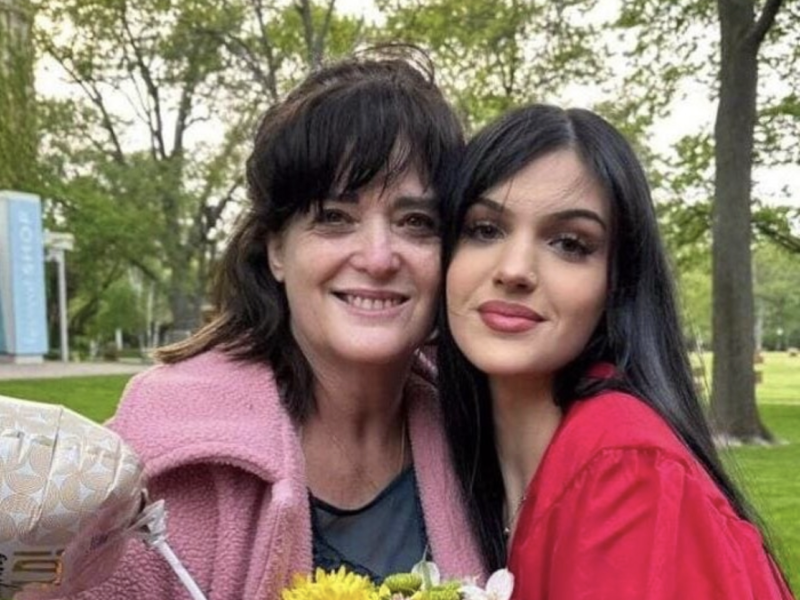Newly appointed principal flutist Jessica Sindell’s honeymoon period with the Oregon Symphony has spawned a surprising new passion: Playing pops.
“I thought they’d be a breeze, but rhythmically it’s more challenging to learn than a classical piece,” said Sindell, 23, an Eastman School of Music graduate who began her gig with the Portland orchestra in January.
“We had a Benny Goodman concert and the conductor said in certain pieces he wanted us to just ‘swing.’ Everyone around me picked it up quickly. I did too, but I’m not used to the genre. I had to take it home and practice ‘swing.’ In this odd way, it’s more challenging and makes the classical easier.”
Sindell first picked up the flute in fifth grade. “I figured out how to vibrato on the instrument and ran to tell my mother. We got so excited. Then I auditioned for the school band.” Her father, who played cello, taught Jessica her first three chords on the piano.
Visiting recently from Cleveland, Steven Sindell joined his daughter mid-interview at a downtown Portland hotel, soon offering musical tidbits and chatting about his sister, violinist Carol Sindell, who teaches at Portland State University. He also reminisced fondly about family outings spent at a Cleveland Jewish community center with his wife, the Israeli-born pianist and entertainer Rachel Sindell; son Daniel, now 21; and Jessica, who loved participating in Jewish-styled theatrical productions.
During what “could have been” her bat mitzvah year, Jessica visited Israel and met up with Grandma Tova, “who cooked like no other.” Tova Gilboa, an Auschwitz survivor in her 80s, has visited the family home in Cleveland.
While in high school, the aspiring flutist found great inspiration studying with Martha Aarons, Cleveland Orchestra’s then second chair. “I would go to concerts and hearing my own teacher play had a huge impact on me,” she recalled. “Martha was strict about what she wants from me, in terms of technique and sound, and knew exactly how to prepare me for college auditions.”
Similarly, flutist Bonita Boyd, Sindell’s instructor at Eastman at the University of Rochester, NY, was pivotal in fostering her young charge’s leadership potential, encouraging Sindell to audition solely for principal slots.
“I felt if Jess plays in a principal position she will be heard,” said Boyd, a soloist who for 16 years occupied the first chair with the Rochester Philharmonic. “This is very important because her voice is so beautiful, so moving.
“When you’re a principal you are heard as a soloist. This is very different to playing in a section which has its own demands, where part of the job is to blend and become a unit with the principal flute. It has to work that way.”
Receiving unconditional support from the ranks has proven yet another unexpected bonus for Sindell. “It’s a special experience to play with a second flutist who is so supportive,” she said of colleague Alicia DiDonato Paulsen. “This is not normally what happens in an orchestra. In my contract I can have relief and give up some pieces to my associate principal. But because I’m new to this job and what I know is limited she supports me in playing as much principal flute as possible.”
She adds: “I want to play the solos. I want to show them what I’ve got. I want to tell my story.”
Sindell, who signed a renewable one-year contract – then comes tenure – with the Oregon Symphony, remains free to pursue outside solo engagements, provided no scheduling conflicts arise. Counting concerti by Mozart, Ibert and Nielsen and more in her repertory, she deems concertizing a compatible path and cites as an example flutist James Galway, the one-time Berlin Philharmonic principal who went on to a stellar concert and recording career – classical, pop, film, you name it.
For now, however, Sindell’s focus remains absorbing new works in advance of Oregon Symphony concerts.
“I’m trying to learn works weeks ahead of time,” she says. “I can take a rest once I know it and come back closer to the dates. I’m not putting in too many hours of practice here, though. I have to be careful of my jaw; I have the rest of my life to worry about. Mental study has become major for me. I also listen and play with recordings. Yes, recordings can influence my interpretation, but if a conductor does not like it and tells me what he wants me to do, I’ll do it. It’s my job.”
Oregon Symphony Music Director Carlos Kalmar remains cognizant of the learning curve she confronts. “It has to be understood that a lot of repertoire she has to play right now is brand new for her,” he indicated via e-mail. “She cannot rely on having played those pieces somewhere else. This makes her job more complex, but she has very experienced musicians around herself, and she is a quick study…”
After a long practice routine, Sindell takes “mindless breaks” into social media. Yes, she absolutely has a Facebook page. No Twitter account. A friend updates her website. The flutist also likes to jam to self-created playlists on Pandora (internet) radio, and these days favors listening to French Café music.
“There are so many different things I am taking in now,” she explains. “I have to sacrifice having fun like some of my college friends would typically do. In the end, when I feel really prepared on stage it is so rewarding; I did not get that sense of accomplishment in school. What a feeling to put a concert on the back burner when you are finished and be able to say, ‘I just did that. I’ve really done that.’ And you get paid for it.”
Greta Beigel, a former Los Angeles Times staff writer and arts editor, recently published Kvetch: One Bitch of a Life, a memoir about growing up Jewish and a gifted pianist in South Africa. She is the author of Mewsings: My Life as a Jewish Cat, and a short work about her father, A Jew from Riga, which are available on www.amazon.com.





